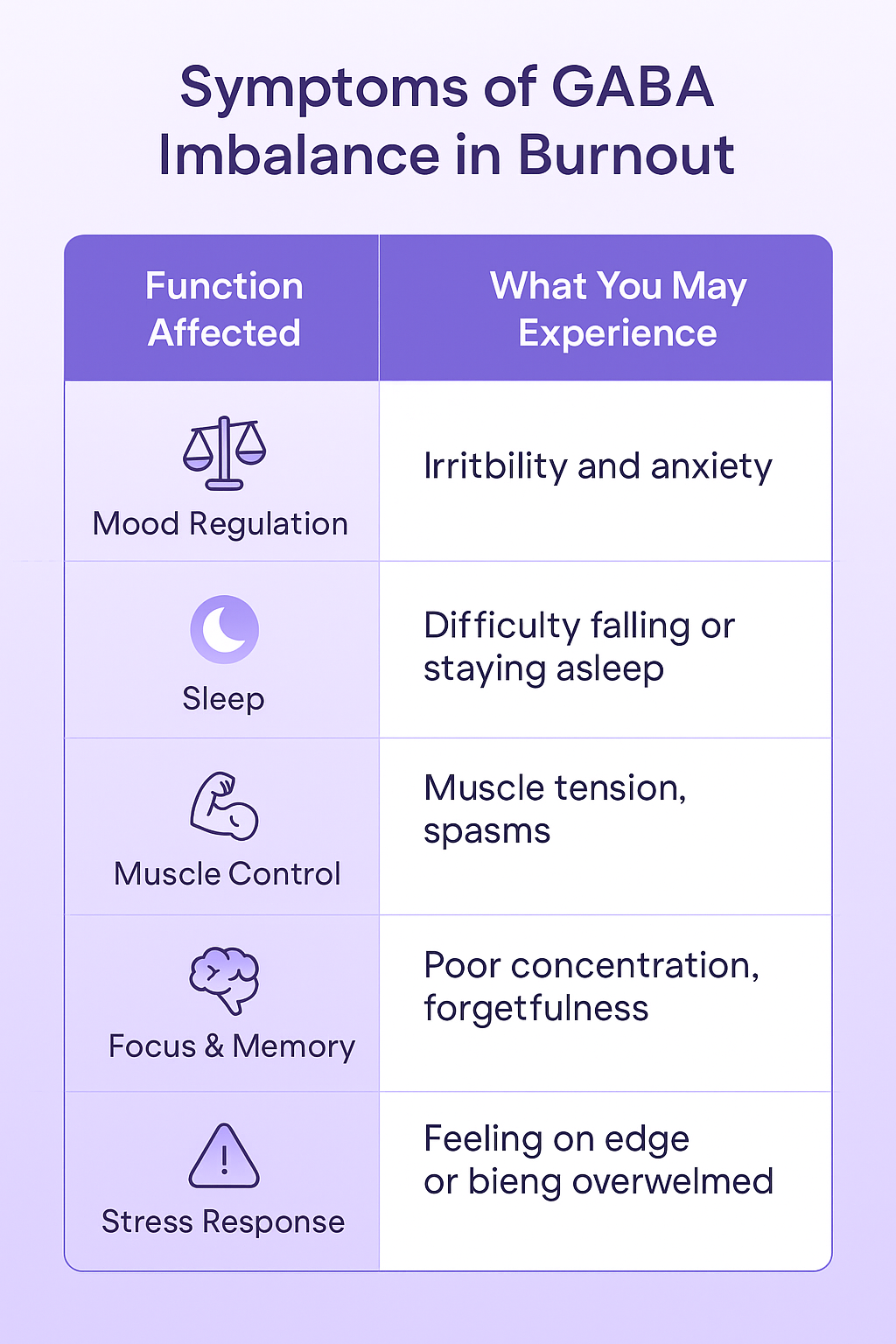GABA and Burnout: How Stress Silences the Brain’s Calming Messenger
Have you ever felt like your brain won’t stop racing, even when you’re exhausted? Or find yourself lying awake at night with a body that won’t relax? If so, your brain’s GABA system may be under strain.
GABA (gamma-aminobutyric acid) is the brain’s main inhibitory neurotransmitter, the chemical that slows things down so you can feel calm, focus, and sleep. When burnout disrupts this system, your brain loses its “brakes,” resulting in anxiety, tension, and insomnia.
This blog will explain how GABA works, how burnout impairs it, and what steps you can take to rebalance and feel calm again.
What Is GABA?
GABA plays a crucial role in:
Reducing neural overactivity
Promoting relaxation and sleep
Stabilizing mood
Preventing excessive stress responses
It acts by binding to GABA receptors in neurons, making it harder for those cells to fire. In essence, GABA is the body’s natural tranquilizer.
When GABA levels are low, the brain becomes overstimulated, leading to the classic “wired but tired” feeling of burnout.
GABA Pathways in the Brain
GABA is widely distributed throughout the brain, but major GABAergic pathways include:
Cerebral Cortex: Regulates cognition and consciousness
Amygdala: Controls fear and anxiety responses
Thalamus: Relays sensory information and controls sleep-wake cycles
Hippocampus: Modulates memory and emotional responses
Burnout reduces GABA activity across these regions, resulting in widespread emotional and cognitive symptoms.
How Burnout Disrupts GABA Function
1. Reduced GABA Production
Chronic stress depletes enzymes and nutrients necessary for GABA synthesis, lowering levels in the brain.
2. Receptor Desensitization
Persistent stress causes GABA receptors to become less responsive, weakening GABA’s calming effect.
3. Increased Excitatory Activity
With GABA suppression, excitatory neurotransmitters like glutamate go unchecked, further driving anxiety and insomnia.
Symptoms of GABA Imbalance in Burnout
Why GABA Matters in Burnout
GABA is essential for shutting off the body’s stress response and allowing restful sleep. Low GABA levels can create a vicious cycle of:
Persistent anxiety
Sleeplessness
Emotional exhaustion
Poor cognitive performance
This “always on” state dramatically accelerates burnout progression.
Can You Restore GABA Balance?
Yes. Your brain can recover from GABA dysfunction with time and supportive habits.
1. Mindfulness and Relaxation
Meditation, deep breathing, and gentle yoga enhance GABA production.
MelodiaSync’s EEG-guided relaxation therapy supports calming brainwaves.
2. Exercise
Moderate aerobic activity boosts natural GABA levels.
3. Nutrition
Include magnesium, vitamin B6, and fermented foods to support GABA synthesis.
4. Sleep Hygiene
Keep a consistent sleep routine and create a calming bedtime ritual.
5. Limit Stimulants
Reduce caffeine, alcohol, and excessive screen exposure that impair GABA function.
How MelodiaSync Can Help
MelodiaSync’s EEG-guided sound programs are designed to:
Promote parasympathetic nervous system activity
Help regulate brainwaves for calm and sleep readiness
Support the natural restoration of GABA levels
Regular use can help break the stress-sleep-anxiety cycle common in burnout.
Reclaiming Calm
Burnout suppresses the brain’s natural calming messenger: GABA. This leads to the anxious, restless, and sleepless state many professionals experience.
The good news? You can rebuild your GABA system with lifestyle changes and science-backed tools like MelodiaSync.
Your calm is waiting. Reclaim it.
Disclaimer: This blog post is intended for informational purposes only and does not constitute medical advice. Please consult a qualified healthcare professional for any medical concerns or treatment decisions.


